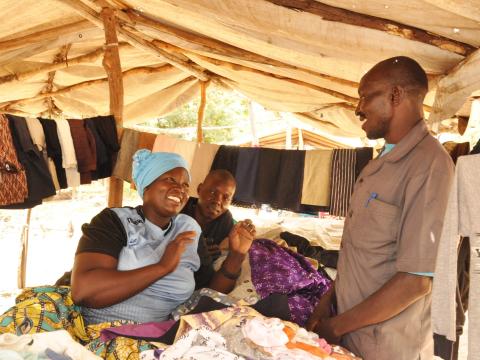Cash for work enriching lives of South Sudanese refugees in Uganda

By Derrick Kyatuka, Communications Officer, West Nile Refugee Response
Coping with life in a foreign land in a refugee settlement is a major challenge. One has to build their lives afresh. That is the dilemma of the thousands who fled South Sudan when the civil war broke out in December 2013. As they fled for safety to neighbouring countries, including Uganda, they came with virtually nothing but the clothes on their backs.
Fortunately, humanitarian organisations like World Vision have eased the lives of these refugees by providing monthly assistance through core relief items, hot meals, child protection support, water, sanitation and hygiene (WASH) facilities.
In addition, to promote economic resilience and social cohesion among the refugees and the host community, World Vision, in partnership with the United Nations Development Programme (UNDP), launched a “Cash for Work” project in Imvepi and Bidibidi settlements in August 2018. Under this project, selected refugees and members of the host community were engaged in activities like tree planting, road construction and garbage collection and paid for their labour.
Teaming to start a business
Francis Amule, a beneficiary in Imvepi settlement, participated in road construction and tree planting.
“I joined the project in last year (August 2018) and after participating in the project activities, I received UGX 465,000 (about US$ 126) from World Vision. I had many business ideas but the money was not enough to set up an independent business. I teamed up with 16 friends who were also part of the project and everyone (each one) contributed UGX 400,000 (about US$ 108) and we bought a milling machine,” Francis says.
The group consists of 10 ladies and 6 men. They zeroed in on this business because they wanted all the members to be actively involved and understand the business dynamics.
“We started operations in April this year and we have a work schedule where all members are active in the business operations. They now understand when business proceeds are low. On a daily we make UGX 40,000 (about US$ 11) that excludes the day’s expense on fuel,” Francis adds.
He says they have also formed a savings group where every member saves according to his or her ability. The savings group also provides loans to members and they are able to take their children to school, provide basic needs and have a good diet.
“We are grateful to World Vision and UNDP for supporting us. We no longer depend on humanitarian assistance because we make money and meet our needs on time. Before the intervention, life was very challenging as we struggled to meet children’s needs. We have also been able to bring services closer to people and we hope to buy another machine in future and serve more people,” he notes.
Francis Awule, the chairperson of Salam Maize Milling Group at his workplace in ImvepiA clothes business
Rukia invested her cash for work remuneration in vending second hand clothes at Point J market in Imvepi settlement. Her customer base continues to grow and on a good market day, she earns UGX 300,000 (about US$ 81).
“I participated in tree planting and road construction. The work was tedious but out of my sweat, I was able to start up the business that has turned my life around. Before, I used to stay in a single room with my three children but from the business, I have managed to construct a bigger house, my children now have school uniforms and I can fully support them in school. The monthly food ration was hardly enough for us but currently, I am in position to buy more food and even change diet of my children,” a jolly Rukia says.
She adds: “My future plan is to buy goats and chicken and start a side business to supplement by clothes selling business. As a single mother, I need to work to make sure my children never lack anything.”
Husband and wife, David and Eva at their work station
David and Eva went into tailoring
David Malis and Eva Maneno used their Cash for Work earnings to start up a tailoring business. The couple says the project has helped them to take good care of their two children and four foster children.
“I have a big family. Before the project, I struggled to provide for them but through the business, I can meet all their needs. My business has grown progressively and through the business proceeds, I bought a second sewing machine for my wife. On a daily we earn UGX 60,000 (about US$ 16). The only challenge we face currently is of people who want certain designs that we cannot make.”
Forming a 13-member team
Robert Lasu and Felex Arike are members of Pajimungi Wholesale Traders. The duo is part of 13 members (9 ladies and 4 men) who invested their Cash for Work money in selling merchandise. Each member contributed UGX400,000 (about US$ 108) to raise starting capital.
“On a good day, we earn between UGX 150,000 to 200,000 (about US$ 40 to 54) and we save the profits in our savings group. So far, we have saved about UGX 750,000 (about US$ 206),” says Robert.
“We hold monthly meetings to evaluate the progress of the business. This has helped to keep our business flourishing. Most of the group members have been able to provide for their families, especially children whose needs are many,” he adds.
Felex says they are saving money with the hope of opening up another branch within the settlement.
These three inspiring stories are just a few of 800 South Sudanese refugees whose lives are being enriched by the Cash for Success project and other livelihood transforming projects.